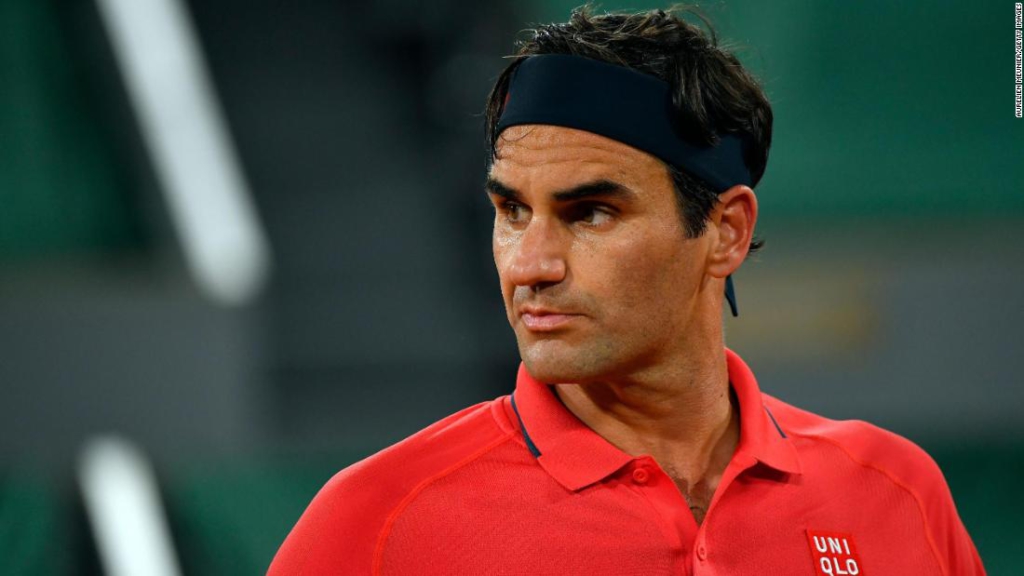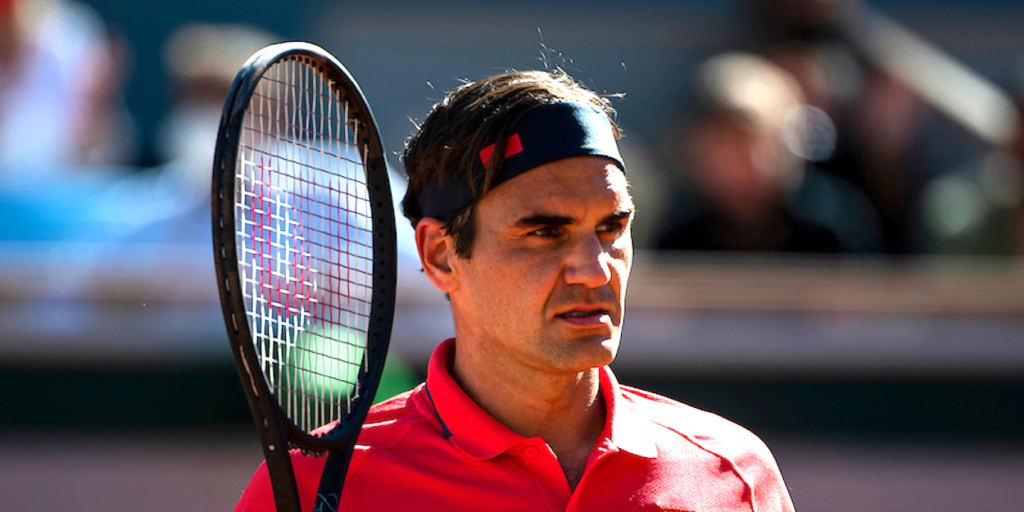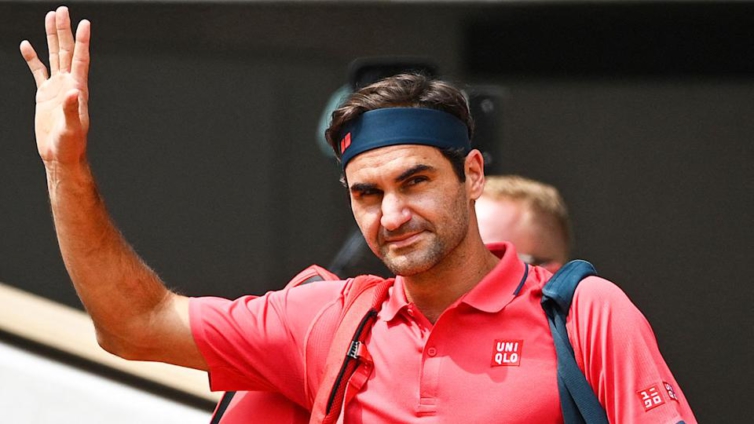Roger Federer says he may pull out of the French Open if there is too much risk to his knee, and to his Wimbledon prospects, from playing on.
The Swiss beat Dominik Koepfer over three-and-a-half hours late on Saturday in only his sixth match since having double knee surgery.
Federer, 39, is due to play Matteo Berrettini in the last 16 on Monday.
But he said he will decide later on Sunday whether now would be the "perfect time to take a rest".
The 20-time Grand Slam champion lacked fluency and trust in his game before coming through to beat Germany's Koepfer 7-6 (7-5) 6-7 (3-7) 7-6 (7-4) 7-5 at a near-empty Roland Garros.
Eighth seed Federer is playing in only his third tournament since January 2020 and says he is using it to build up fitness for Wimbledon, which starts on his favoured grass surface at the end of June.
"We go through these matches, we analyse them highly and look on what's next," he said.
"We will do the same here on Sunday, because I need to decide if I keep on playing or not. Is it not too much risk at this moment to keep on pushing or is this just a perfect way to just take a rest?"
Italy's ninth seed Berrettini, 25, reached the fourth round at Roland Garros for the first time with a 7-6 (8-6) 6-3 6-4 win over South Korea's Kwon Soon-woo.
After hitting 52 winners against Kwon to continue a fine clay-court season, Madrid runner-up Berrettini will be widely considered the favourite against 2009 champion Federer.

Despondent Federer struggles against Koepfer
Federer increasingly struggled against Koepfer, ranked 59th in the world, in a gruelling contest that lacked quality and was played in a soulless atmosphere without fans.
In a lengthy opening set, Federer was unable to clinch any of five break points - including a set point in the 10th game - before an untimely double fault from Koepfer helped the Swiss to nick the tie-break.
The ruthless edge appeared, eventually, in the opening game of the second set when Federer whipped a crosscourt forehand past Koepfer to convert his third break point.
Little separated the pair, who traded three more breaks in a row, during another close and cumbersome set. The solid Koepfer was able to draw unforced errors out of the erratic Federer, who also struggled with his usually reliable serve.
Federer's demeanour became increasingly despondent after Koepfer broke in the first game of the third set and he looked to be waning physically as the German remained in control.
Somehow, the Swiss shifted the momentum back in his favour out of nowhere with a break back in the eighth game and, after missing a set point in the 12th, took the third tie-break.
The fourth set looked destined for another tie-break before Federer dug deep to pick up his level and win the final three games for victory.
But there were no fans to celebrate the moment, which seemed particularly stark when it was a player who has entertained packed stadiums for so many years.
"There are still a few people here, I don't know who they are: sponsors, journalists, my team too," Federer said.
"I love tennis, I like to play. I might have been more nervous if the stadium had been full."

The night matches start too late' - does Roland Garros need to rethink the late starts?
For the first time, the French Open has introduced daily night sessions, which consist of one match starting at 9pm local time under the floodlights on Court Philippe Chatrier.
That meant the third set did not start until shortly after 11pm, the match eventually finishing not long before 1am, and left many tennis fans on social media platforms wondering who actually benefited from the late scheduling.
No fans were present on court because of the 9pm curfew imposed by the French government as part of coronavirus restrictions.
"I think these night matches start too late," former British number one Laura Robson said on BBC Radio 5 Live.
"They have got a very quick turnaround before their next match, probably get back to the their hotel between 2am and 3am, then have to reset.
"It is not easy, especially when your next opponent has long been and gone.
"I can't imagine this is what Federer was expecting when he walked out on the court, to be there so late. It is one other thing to worry about. Less recovery time and less sleep, with Berrettini to come."
Only one of the six night matches so far have been a women's match - Serena Williams' opener against Irina-Camelia Begu on Monday - and it would be optimistic to think a men's match would only last two hours, making late finishes inevitable.
'Federer is not supposed to play like this' - analysis
Russel Fuller, BBC tennis correspondent
It was a match that will live long in the memory, although not always for the right reasons.
Roger Federer is not supposed to play like this - even though this was just his sixth match in the past 16 months.
There was little fluency, and some horrible errors. But in his 40th year, and at nearly a quarter to one on a Sunday morning in a soulless and empty stadium, Federer still found the key to victory.
Night sessions are here to stay. They will look and sound great in years to come - as long as they don't start as late as 9pm.
But they are absolutely no fun when there is a curfew in town.
Latest Stories
-
Anticipation builds as Junior Speller hosts nationwide auditions
13 mins -
The driver’s mate conundrum
47 mins -
IMF Deputy Chief worried large chunk of Eurobonds is used to service debt
1 hour -
Otumfuo Osei Tutu II celebrates 25 years of peaceful rule on golden stool
1 hour -
We have enough funds to pay accruing benefits; we’ve never missed pension payment since 1991 – SSNIT
2 hours -
Let’s embrace shared vision and propel National Banking College – First Deputy Governor
2 hours -
Liverpool agree compensation deal with Feyenoord for Slot
2 hours -
Ejisu by-election: There’s no evidence of NPP engaging in vote-buying – Ahiagbah
2 hours -
Ejisu by-election: Independent ex-NPP MP’s campaign team warns party against dubious tactics
3 hours -
ZEN Petroleum supports Tse-Addo Future Leaders School
3 hours -
NPP must win back Adentan seat in 2024 polls – Obeng Fosu
4 hours -
PPA Clarification: The dark side of the World Bank’s ‘giveaways’ in Ghana by Bright Simons
5 hours -
Blinken says China helping fuel Russian threat to Ukraine
5 hours -
MHA declares May as Purple Month for Mental Health Awareness
6 hours -
WAEC arrests former headmaster over illegal students registration
6 hours

